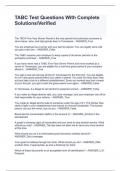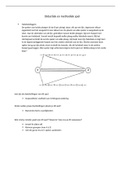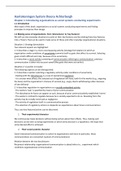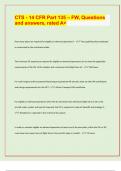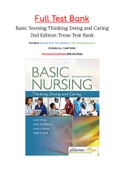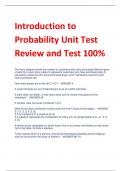BER 220
ENTREPRENEURIAL LAW
Summaries
Study Unit 1 The Law of Partnerships
Chapter 23
Compiled by Nicha van der Merwe
, 1.1.PARTNERSHIPS: A partnership is the coming together of two or more persons who conclude a
partnership contract or agreement with the aim of running a business for the purposes of making a profit for
their joint benefit. All partners should contribute money, property, services/labour, skills or experience that will
be at the disposal of the partnership for the purposes of running business and all these are subjected to risk.
1.2.CHARACTERISTICS OF PARTNERSHIPS
Formed by a contract partners should conclude a contract and all the general requirements of the
conclusion of the contract should be complied with.
There are no formal legal requirements for registration of a partnership as it is
required when forming companies. E.g. when forming a company you will need
the Notice of Incorporation, Memorandum of Incorporation and the prescribed
fee. When forming a partnership you do not need all these.
However, the Consumer Protection Act 68 of 2008 requires the registration of a
business name before a partnership can start operation or conducting
business.
The contract can be concluded orally, in writing or tacitly (implied without being
directly stated between parties).
Aim to make a profit The aim of a partnership is to make profit or any patrimonial gain (gain in the
person’s financial status).
Without this there is no partnership.
Association of at least two A partnership is always the coming together of two or more people and in
persons terms of the current Companies Act there is no limit.
20 or more people can form a partnership.
One person cannot form a partnership.
Not a juristic person A partnership is not a juristic or legal person, meaning that it is not regarded as
separate and legally independent person from the partners.
It does not gain legal personality, upon formation.
This means that in the eyes of the law a partnership is not separate from the
partners.
As the partnership does not have a legal personality, the assets of the
partnership are owned by partners jointly.
The partners also jointly liable for the partnership’s debts.
They (partners) must also jointly enforce claims that are in favour of the
partnership.
However, the High court rule 14 and Magistrates’ courts rule 52 for the sake of
convenience allow partners sue in the name of the partnership and third parties
to sue the partnership in its name.
Insolvent Partnership: (liabilities exceed assets and unable to pay its debts), the partnership’s estate will
simultaneously be sequestrated with the estates of the partners in the partnership but separately. This means
Compiled by Nicha van der Merwe
, that there will be two separate trustee’s accounts, one for the partnership’s estate and the estate of each
partner. The rationale is for the creditors of the partnership to claim from the estate of the partnership and if
there is money left it can be proportionally shared with each partner’s estate.
Partners Bear the Risk of the Adventure: Since partnerships do not have separate legal personality,
ordinary partners bear the risk of the business. That is why in the event of insolvency of the partnership, all
partners will be simultaneously sequestrated and the remaining money from each partner’s estate will be
transferred to the partnership’s estate to pay its creditors.
1.3.FORMATION OF PARTNERSHIPS
the conclusion of the partnership contract where two or more parties have the intention to form a
partnership, undertake to run the partnership’s business for the purposes of making profit, undertake
to run the partnership for joint benefit and undertake to contribute something of value to run the
partnership’s business.
The partnership contract should have all the essentialia which are characteristics that distinguish it
from other contracts.
ESSENTILIA of the partnership Contract
Each partner must contribute something of value to the partnership’s estate and such must be subject to risk e.g.
money, tools, building, labour and skills. These will help to run the business.
The common business must be carried for joint benefit of partners.
The partnership’s business should be operated for the purpose of making profit or any financial gain.
INTENTION OF PARTIES
The presence of all aforementioned essentialia above is prima facie (sufficient to conclude) proof that partners
concluded a partnership agreement.
However, they still have to have an intention to conclude a partnership.
If any of the aforementioned essentialia is not available then the agreement is not a partnership agreement.
1.4.GENERAL REQUIREMENTS OF THE PARTNERSHIP AGREEMENT
The parties must reach consensus/agreement
The parties must have contractual capacity
The contract and performance must be legally possible.
The performance must be physically possible.
Contractual formalities if any must be complied with.
1.5. RIGHTS OF PARTNERS
Profits, remuneration, Partners are entitled to profit and where there is an agreement they are entitled to
interest and indemnity remuneration for labour and interest on their capital. They are always indemnified
(protected) against damages and expenses incurred in the execution of their duties.
Compiled by Nicha van der Merwe
, Control and related matters (a)General: All partners in the partnership are entitled to conclude management
actions in transactions that are within the scope of the partnership’s business except
where there is an agreement to the contrary. In other words, they are all equally in
control of the partnership where the transactions are within the scope of the
partnership’s business.
(b) Access to books & records: Partners or their representatives who undertake not
to misuse the confidential information can inspect the books of the partnership unless
they are excluded in terms of the agreement or waive their right. They may demand
that the books be kept at the place of business of the partnership.
(c) Use of partnership assets: Co-partners have access to the assets of the
partnership for the purposes of promoting the partnership’s business. No partner can
deny other partners access to the assets of the partnership unless they consented. No
partner can for personal use, take or dispose the partnership’s assets.
1.6. DUTIES OF PARTNERS
To contribute something of Every partner must make his/her agreed contribution to the partnership assets and
value if he fails then parties can institute an action known as actio pro socio to claim
specific performance promised by the partner in terms of the contract and where
dissolution of the partnership is the appropriate remedy, specific performance will
not be effected or available.
To share in the losses as per the agreement and if there is no agreement, in the proportion that profits are
shared. Some partners as per agreement can be excluded from sharing net losses.
However, general costs of running business and risk of business in case it fails
(insolvent) are borne by all parties.
To exercise care Partners are expected to exercise the same care and skill that they will exercise
in their own affairs when representing the partnership.
where partnership suffers damage or loses profit due to the intentional (wilful) or
negligent (careless) actions of the partner, the partner will be held personally
liable for the damage or loss of profit. E.g. Builder negligently builds a wall of
poor quality and the partnership loses profit.
The test for negligence is the reasonable persons test.
this means that a question will be asked as to how a reasonable person
would have acted in the position of the partner. If the actions of the partner
deviate from those of the reasonable person, then the partner will be held liable.
Partners are not generally expected to exercise extra-ordinary skill, unless they
undertook to contribute the skill in the business and they have to exercise the
skill as they are reasonably expected to do so.
Compiled by Nicha van der Merwe
ENTREPRENEURIAL LAW
Summaries
Study Unit 1 The Law of Partnerships
Chapter 23
Compiled by Nicha van der Merwe
, 1.1.PARTNERSHIPS: A partnership is the coming together of two or more persons who conclude a
partnership contract or agreement with the aim of running a business for the purposes of making a profit for
their joint benefit. All partners should contribute money, property, services/labour, skills or experience that will
be at the disposal of the partnership for the purposes of running business and all these are subjected to risk.
1.2.CHARACTERISTICS OF PARTNERSHIPS
Formed by a contract partners should conclude a contract and all the general requirements of the
conclusion of the contract should be complied with.
There are no formal legal requirements for registration of a partnership as it is
required when forming companies. E.g. when forming a company you will need
the Notice of Incorporation, Memorandum of Incorporation and the prescribed
fee. When forming a partnership you do not need all these.
However, the Consumer Protection Act 68 of 2008 requires the registration of a
business name before a partnership can start operation or conducting
business.
The contract can be concluded orally, in writing or tacitly (implied without being
directly stated between parties).
Aim to make a profit The aim of a partnership is to make profit or any patrimonial gain (gain in the
person’s financial status).
Without this there is no partnership.
Association of at least two A partnership is always the coming together of two or more people and in
persons terms of the current Companies Act there is no limit.
20 or more people can form a partnership.
One person cannot form a partnership.
Not a juristic person A partnership is not a juristic or legal person, meaning that it is not regarded as
separate and legally independent person from the partners.
It does not gain legal personality, upon formation.
This means that in the eyes of the law a partnership is not separate from the
partners.
As the partnership does not have a legal personality, the assets of the
partnership are owned by partners jointly.
The partners also jointly liable for the partnership’s debts.
They (partners) must also jointly enforce claims that are in favour of the
partnership.
However, the High court rule 14 and Magistrates’ courts rule 52 for the sake of
convenience allow partners sue in the name of the partnership and third parties
to sue the partnership in its name.
Insolvent Partnership: (liabilities exceed assets and unable to pay its debts), the partnership’s estate will
simultaneously be sequestrated with the estates of the partners in the partnership but separately. This means
Compiled by Nicha van der Merwe
, that there will be two separate trustee’s accounts, one for the partnership’s estate and the estate of each
partner. The rationale is for the creditors of the partnership to claim from the estate of the partnership and if
there is money left it can be proportionally shared with each partner’s estate.
Partners Bear the Risk of the Adventure: Since partnerships do not have separate legal personality,
ordinary partners bear the risk of the business. That is why in the event of insolvency of the partnership, all
partners will be simultaneously sequestrated and the remaining money from each partner’s estate will be
transferred to the partnership’s estate to pay its creditors.
1.3.FORMATION OF PARTNERSHIPS
the conclusion of the partnership contract where two or more parties have the intention to form a
partnership, undertake to run the partnership’s business for the purposes of making profit, undertake
to run the partnership for joint benefit and undertake to contribute something of value to run the
partnership’s business.
The partnership contract should have all the essentialia which are characteristics that distinguish it
from other contracts.
ESSENTILIA of the partnership Contract
Each partner must contribute something of value to the partnership’s estate and such must be subject to risk e.g.
money, tools, building, labour and skills. These will help to run the business.
The common business must be carried for joint benefit of partners.
The partnership’s business should be operated for the purpose of making profit or any financial gain.
INTENTION OF PARTIES
The presence of all aforementioned essentialia above is prima facie (sufficient to conclude) proof that partners
concluded a partnership agreement.
However, they still have to have an intention to conclude a partnership.
If any of the aforementioned essentialia is not available then the agreement is not a partnership agreement.
1.4.GENERAL REQUIREMENTS OF THE PARTNERSHIP AGREEMENT
The parties must reach consensus/agreement
The parties must have contractual capacity
The contract and performance must be legally possible.
The performance must be physically possible.
Contractual formalities if any must be complied with.
1.5. RIGHTS OF PARTNERS
Profits, remuneration, Partners are entitled to profit and where there is an agreement they are entitled to
interest and indemnity remuneration for labour and interest on their capital. They are always indemnified
(protected) against damages and expenses incurred in the execution of their duties.
Compiled by Nicha van der Merwe
, Control and related matters (a)General: All partners in the partnership are entitled to conclude management
actions in transactions that are within the scope of the partnership’s business except
where there is an agreement to the contrary. In other words, they are all equally in
control of the partnership where the transactions are within the scope of the
partnership’s business.
(b) Access to books & records: Partners or their representatives who undertake not
to misuse the confidential information can inspect the books of the partnership unless
they are excluded in terms of the agreement or waive their right. They may demand
that the books be kept at the place of business of the partnership.
(c) Use of partnership assets: Co-partners have access to the assets of the
partnership for the purposes of promoting the partnership’s business. No partner can
deny other partners access to the assets of the partnership unless they consented. No
partner can for personal use, take or dispose the partnership’s assets.
1.6. DUTIES OF PARTNERS
To contribute something of Every partner must make his/her agreed contribution to the partnership assets and
value if he fails then parties can institute an action known as actio pro socio to claim
specific performance promised by the partner in terms of the contract and where
dissolution of the partnership is the appropriate remedy, specific performance will
not be effected or available.
To share in the losses as per the agreement and if there is no agreement, in the proportion that profits are
shared. Some partners as per agreement can be excluded from sharing net losses.
However, general costs of running business and risk of business in case it fails
(insolvent) are borne by all parties.
To exercise care Partners are expected to exercise the same care and skill that they will exercise
in their own affairs when representing the partnership.
where partnership suffers damage or loses profit due to the intentional (wilful) or
negligent (careless) actions of the partner, the partner will be held personally
liable for the damage or loss of profit. E.g. Builder negligently builds a wall of
poor quality and the partnership loses profit.
The test for negligence is the reasonable persons test.
this means that a question will be asked as to how a reasonable person
would have acted in the position of the partner. If the actions of the partner
deviate from those of the reasonable person, then the partner will be held liable.
Partners are not generally expected to exercise extra-ordinary skill, unless they
undertook to contribute the skill in the business and they have to exercise the
skill as they are reasonably expected to do so.
Compiled by Nicha van der Merwe



